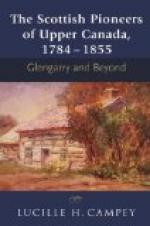“As soon as we reached the lodge, the bear’s head was adorned with all the trinkets in the possession of the family, such as silver armbands and wristbands, and belts of wampum; and then laid upon a scaffold, set up for its reception, within the lodge. Near the nose was placed a large quantity of tobacco.
“The next morning no sooner appeared, than preparations were made for a feast to the manes. The lodge was cleaned and swept; and the head of the bear lifted up, and a new Stroud blanket, which had never been used before, spread under it. The pipes were now lit; and Wawatam blew tobacco smoke into the nostrils of the bear, telling me to do the same, and thus appease the anger of the bear, on account of my having killed her.
“At length, the feast being ready, Wawatam commenced a speech, resembling, in many things, his address to the manes of his relations and departed companions; but, having this peculiarity, that he here deplored the necessity under which men laboured, thus to destroy their friends. He represented, however, that the misfortune was unavoidable, since without doing so, they could by no means subsist. The speech ended, we all ate heartily of the bear’s flesh; and even the head itself, after remaining three days on the scaffold, was put into the kettle. The fat of our bear was melted down, and the oil filled six porcupine-skin bags. A part of the meat was cut into strips, and fire-dried, after which it was put into the vessels containing the oil, where it remained in perfect preservation, until the middle of summer.”
In the spring of 1762 Henry once more returned to Fort Michili-Makinak, and went sugar-making with his Indian companions. Whilst engaged in this agreeable task, a child belonging to one of the party fell into a kettle of boiling syrup. It was instantly snatched out, but with little hope of its recovery. So long, however, as it lived, a continual feast was observed; and this was made “to the Great Spirit and Master of Life”, that he might be pleased to save and heal the child. At this feast Henry was a constant guest; and often found some difficulty in eating the large quantity of food which, on such occasions as these, was put upon his dish.
Several sacrifices were also offered; among which were dogs, killed and hung upon the tops of poles, with the addition of blankets and other articles. These, also, were yielded to the Great Spirit, in the humble hope that he would give efficacy to the medicines employed. But the child died. To preserve the body from the wolves it was placed upon a scaffold, and then later carried to the borders of a lake, on the border of which was the burial ground of the family.
“On our arrival there, which happened in the beginning of April, I did not fail to attend the funeral. The grave was made of a large size, and the whole of the inside lined with birch bark. On the bark was laid the body of the child, accompanied with an axe, a pair of snowshoes, a small kettle, several pairs of common shoes, its own strings of beads, and—because it was a girl—a carrying belt and a paddle. The kettle was filled with meat. All this was again covered with bark; and at about two feet nearer the surface logs were laid across, and these again covered with bark, so that the earth might by no means fall upon the corpse.




